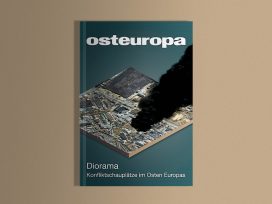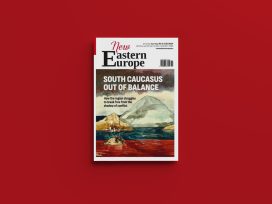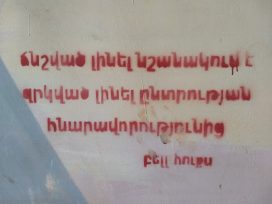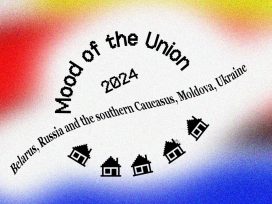By the end of September 2023, the ethnic cleansing of Armenians from Nagorno Karabakh had quickly faded from the attention of the world’s media. The last of the 120,000 Karabakh Armenians had streamed out of their ancestral homeland, leaving behind the less fortunate to face the possibility of show trials in Baku or, worse, possible forced disappearance. Several Russian peacekeepers, including ranking officers, also died during the offensive in a hail of ‘stray’ bullets, leaving no survivors. Was Azerbaijan disposing of inconvenient witnesses? Baku readily apologised; Moscow accepted. Russian military bloggers grumbled ‘betrayal’ through clenched teeth.
In fact, this was not the first time Moscow had enabled Azerbaijani forces to clear Armenian villages in Karabakh. In the fateful summer of 1991, Soviet paratrooper forces hunted down Armenian guerrillas in the region, before Azerbaijani riot police evicted local Armenian inhabitants. Mikhail Gorbachev was apparently hoping that still-Soviet Azerbaijan would support his revamped version of the USSR against the rebellious and increasingly pro-western Armenians. From there to the collapse of Soviet power, it was only a few months.
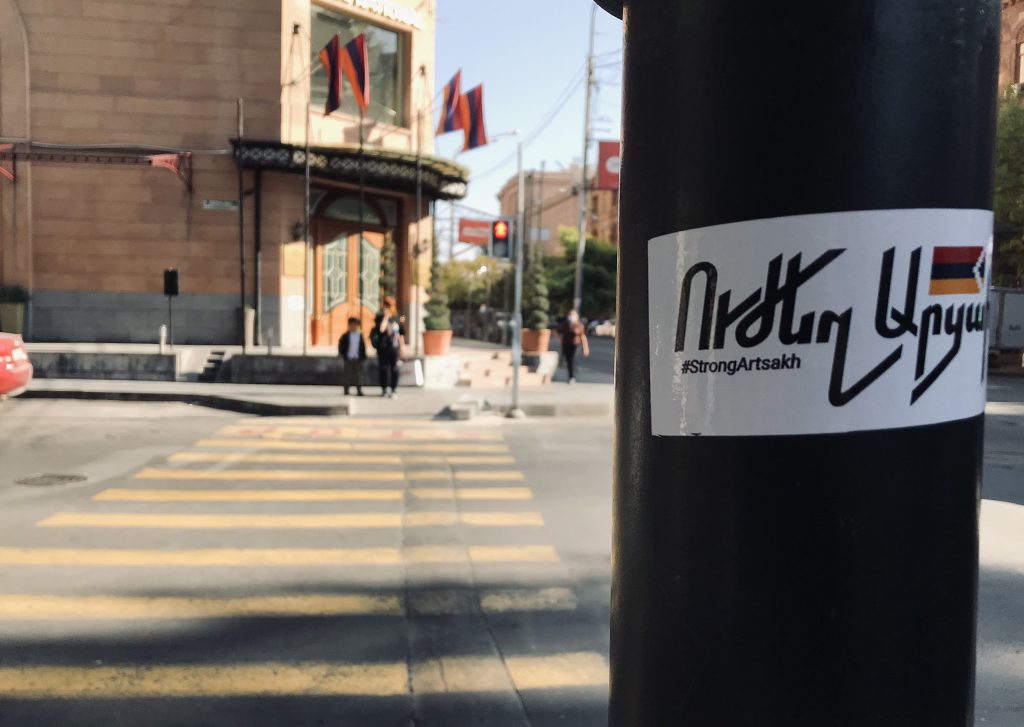
#ArtsakhStrong slogan in Yerevan, Armenia, 2020. Image: Garik Avakian / Source: Wikimedia Commons
Stalin’s logic
Any encyclopaedia is clear on the facts: Armenia is the oldest Christian country with its own church and alphabet. After officially adopting Christianity in A.D. 301, Armenia played an outsized role in late Antiquity. St. Servatius, the patron saint of Maastricht, was an Armenian. But as the waves of conquering migrant peoples flooded the Roman realm, the Armenians were reduced to a leftover minority — like the Celts, the Basques, the Coptic Egyptians, or the defeated Greeks and Balkan Slavs.
With the advent of modernity, scholars became aware of the ancient pedigree of these nations. Next came the dream of nationhood. The outcomes, however, turned on western geopolitics, starting with the Greeks in the 1820s, and ending with the Irish. In 1915, the Armenians faced genocidal extermination in the unravelling Ottoman Empire. Like many such minorities amidst the decay of the old order, the Armenians were accused of being simultaneously capitalist exploiters and socialist revolutionaries. In short, too pro-western and modern.
Just a couple of slivers of the ancient Armenian homeland survived the carnage to find themselves parts of the newly formed Soviet Union after 1920. The larger piece became the Armenian Soviet Socialist Republic (SSR). The lesser chunk, called Nagorno (i.e. mountainous) Karabakh, was attached to the Azerbaijani SSR with its predominantly Muslim and Turkic-speaking population.
Stalin, as Soviet Commissar for the Nationalities, followed a materialist logic. To him, ethnic hatreds were a sign of backwardness. Baku, the capital of newly-created Azerbaijan, was a major centre of oil industry and referred to at the time as the ‘Chicago of the East’.
In fact, Baku at the turn of the 20th century boasted a wonderfully cosmopolitan atmosphere where the modernist Muslim elites switched to the Latin alphabet and established a republic even before Turkey. Azeri educators even dared lampoon Islamic traditions in the illustrated magazine Molla Nasreddin, which was widely read from British India to Morocco.
The thin crust of Azerbaijani westernisers perished in Stalin’s purges of the 1930s. Replacing them were the likes of Heydar Aliyev, a protégé of the NKVD chief Lavrenty Beria in the 1940s, and the founder of Baku’s ruling dynasty since 1969.
The Aliyevs now seem set to outdo the satirical fantasies of Sasha Baron Cohen. President Ilham Aliyev awards the Order of Heydar Aliyev to the vice-president, his spouse Mehriban Aliyeva. They pose for selfies in combat fatigues, standing over conquered Armenian positions. Other Azerbaijani war heroes are hardly ever mentioned. Personalistic power allows for no competition, even if overtly loyal.
Conflict unfrozen
The grotesque details, however, make the façade. History is made by the interplay of structure, agency, and contingency. The key is timing. Why did the Karabakh conflict finally unfreeze precisely now? What can we expect next?
The forgotten expectations of Gorbachev’s perestroika in the late 1980s promised a more humane and rational world order, starting with the USSR itself. These hopes provided tremendous impetus to the intelligentsia, the writers and scientists who, by definition, are the custodians of all things rational and humane. The administrative map, on which the Armenian SSR was separated by a narrow strip of mountain from the autonomous Armenian area in Karabakh, looked irrational. But at the time that appeared irrelevant, since both Azerbaijan and Armenia were merely Soviet republics.
As the USSR neared collapse, however, this cartographic anomaly ignited a chain of terrible events that are now coldly dubbed a ‘population exchange’. In 1990, thousands of ethnic Armenians, mostly urban and educated, were violently expelled from Baku. In 1992–94, Armenian detachments, determined to avenge the trauma of genocide, secured Nagorno Karabakh and a large buffer zone around it, from where Azerbaijani villagers were expelled.
In Baku, after a brief chaotic interregnum under the local democratic intelligentsia, order was restored by the strong hand of Heydar Aliyev. In Karabakh, and soon in Armenia itself, power fell to victorious guerrilla commanders, typically small-town party careerists. This cursory sociology helps explain why neither side seriously sought peace between the ceasefire of 1994 and Azerbaijan’s resumption of war in 2020. Both countries were ruled by former Soviet officials enjoying the corrupt fruits of power, although Heydar Aliyev was a KGB general of legendary shrewdness while his Armenian counterparts were simpler types.
Post-Soviet Azerbaijan became an oil-rich presidency for life. Heydar Aliyev avoided risks and carefully cultivated his regime, which he ultimately passed on to his son and the in-laws. The Armenian regime remained instable, with several presidents succeeding one another, before a successful popular uprising in 2018 swept it aside. The insurgent leader, Nikol Pashinyan, was a journalist of populist bent who had to learn the art of statesmanship on the job, at great expense to his nation. Still, to a large majority of voters, he seemed an improvement upon his predecessors. Turbulent authoritarianism gave way to a turbulent democracy in Armenia. Moscow did not hide its displeasure.
War reignited
The Karabakh war reignited in 2020, while the West was preoccupied with Covid-19 and the Trump circus. The Armenian forces in Karabakh, with their Soviet-era guns and tactics, stood little chance against Azerbaijani armies equipped with advanced weapons from Israel and Russia and stiffened with Turkish advisors.
However, in November 2020 the second Karabakh war came to a strange end, at the very point when Azerbaijani victory seemed imminent. Russian peacekeepers, some of the country’s best-trained troops, arrived on the scene with a vague mandate of undetermined duration. The Armenians had certainly lost. But Azerbaijan ended up with Russians and Turks openly stationed on its territory. The presence of Israelis was widely suspected but never proved.
Evidently, Baku had to accept this bizarre outcome because Putin and Erdogan had become ‘rival partners’, as Moscow commentators put it. Still, in 2020 Putin was on the rise. Karabakh appeared to be merely a piece in a much larger design. A reminder: in summer 2020 Aleksandr Lukashenko, the perennial dictator of Belarus, nearly lost power in the face of massive protests. Putin stepped in and secured Belarus.
The inconclusive war in Karabakh made both Armenia and Azerbaijan awkwardly dependent on Russia. As for Georgia, acquiescence seemed a foregone conclusion under its current faceless leadership. Then in January 2022, an unexpected (always unexpected) popular uprising in Kazakhstan, the largest country in Central Asia, nearly destroyed the regime and the state. Russian peacekeepers again came to the rescue — and, bewilderingly, left almost as soon. Of course, they were needed for the surprise attack on Ukraine. But that gambit failed in the face of Ukrainian resistance.
The fate of Karabakh was then sealed. Baku, ever risk-averse, circled over the target for another year-and-a-half while watching the waning of Russian power. Moreover, Russia itself became critically dependent on Azerbaijan and Turkey for circumventing western sanctions and connecting to its newly precious Iranian partner.
What about Armenia? For Moscow, currently struggling on all fronts, a regime change in Yerevan would certainly be desirable. The Russian military base in Armenia remains Moscow’s last outpost in the South Caucasus. The end of the Armenian presence in Karabakh could yet result in the demise of Pashinyan’s populist democracy.
Yet many Armenians now painfully realise that, after two centuries, Moscow is no longer an ally. This realisation first emerged during Gorbachev’s well-intentioned reforms and ultimately ruined the USSR. Ironically, Putin’s geopolitical scheming might now ruin the Russian position. History is full of such tragic ironies. Small wars in distant places can prove to be World Wars.
